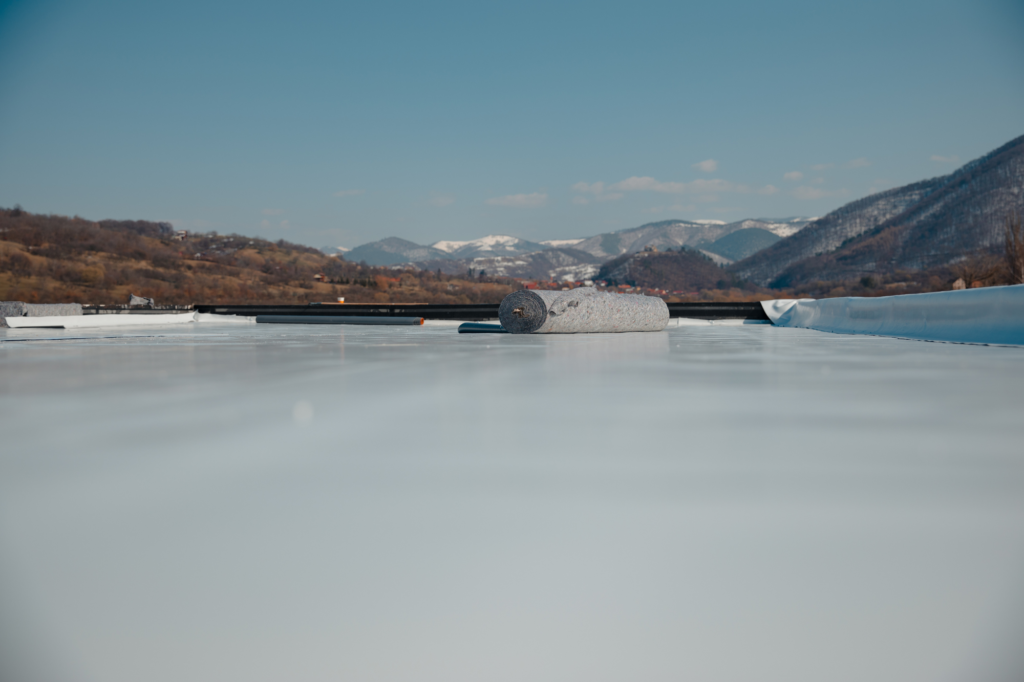
Getting Commercial Roofing Systems Ready For Winter
An industrial property’s roof is one of its most important physical assets. This is especially true during the winter time, when it protects the people, property, and building envelope from intense winter weather. When a roof is not ready for winter weather, it exposes a property to a wide range of risks, including leaks, interior water damage, and property shutdowns. In the long run, any of these problems typically result in more serious financial and operational consequences than the cost of preparing an industrial property’s roof for winter weather.
All types of flat commercial roofing systems, from TPO and EPDM to metal and modified bitumen, should be adequately prepared for winter weather each fall. To explain why, Property Manager Insider built this guide to preparing flat industrial roofs for winter. Highlights include common roof damage caused during the winter, the importance of roof inspections, what to look for in a fall roof maintenance plans, and the benefits of getting a commercial roof ready for the winter each fall.
Flat Industrial Roof Damage Caused By Winter Weather
Harsh winter weather, especially in the Northeast and Midwest can pose serious risks to flat industrial roofs. Threats include snow, ice, sleet, intense wind, freezing temperatures, and hail. All of these natural elements can severely damage an industrial roofing system during the winter. There are many types of industrial roof damage caused by winter weather, including:
- Leaks and Moisture Penetrations
- Ice Dams
- Interior Water Damage
- Snow Drifts
- Thermal Shock
- Wind Damage
- Roof Collapses
Since property managers do not control the weather, there are instances during extreme weather events where industrial roof damage is unavoidable. While some damage is unavoidable, proactive roof maintenance and inspections will help prevent some types of damage and limit issues when damage does occur.
Bi-Annual Roof Inspections
Preparing flat industrial roofs for winter should start with a roof inspection. This can be done by a trusted roofing contractor or an independent roof consultant. While aerial drone and satellite inspections have become popular, property managers should insist the inspection includes walking the roof. Drones and satellites can miss damage and issues that a physical roof inspection will identify.
Industrial property managers should perform two roof inspections per year. One in the spring and one in the fall. The spring inspection will identify any new issues and necessary repairs coming out of the winter. The fall roof inspection will identify any potential issues going into the winter. It is important to address these issues promptly during the fall before freezing temperatures and snow make it significantly harder to fix flat industrial roof.
Who Should Perform Flat Industrial Roof Inspections?
All types of industrial properties can benefit from regular inspections. But that creates the question, who performs flat industrial roof inspections? There are really three answers. The first answer is your current commercial roofing contractor. This is the contractor most familiar with your roof. In many cases, they are already handling roof repairs and preventative maintenance.
The second answer is finding a new commercial roofing contractor. This option is great if you do not want all your eggs in one basket and want a second opinion. The downside to hiring another commercial roofer to perform the inspection is they can provide conflicting information. While this can simply be their unbiased opinion, it can, unfortunately, be a tactic to win work or discredit a competitor.
The final option is a commercial roof consultant. Since consultants are independent and do not offer industrial roofing services, property managers can trust their inspection reports are unbiased. Consultants are also established experts that might identify roofing issues missed by a less experienced inspector from a local commercial roofing company.

Pre-Winter Flat Industrial Roof Maintenance
A low slope commercial roof is an important asset just like a property’s elevators or mechanical equipment. This is why property managers should invest in proactive roof maintenance. A quality maintenance plan will include actionable items to prepare industrial roofs for winter weather including:
- Pre-Winter Roof Inspection
- Clearing Fall Roof Debris
- Testing Drainage/Gutters
- Flashing Inspection
- Addressing Ponding Water
- Checking For Penetrations/Punctures
Even though no industrial roof maintenance plan guarantees an issue free winter, being proactive in the fall absolutely reduces the chances of problems during the colder winter months. Additionally, preparing flat industrial roofs for winter can limit the chances a small roof issue turns into a major problem.
Benefits Of Preparing Flat Industrial Roofs For Winter
One of the single biggest benefits of preparing an industrial roof for winter is ensuring continuity of property operations. Many industrial properties are leased by companies that can’t afford to shutdown because of roof issues every time it snows. As a result, fall roof maintenance is necessary because it is proven to reduce winter roof issues. Additional benefits of winter weather preparation for industrial roofs include:
- Addressing Necessary Repairs
- Continuity Of Property Operations
- Avoiding Costly Roof Replacements
- Extending Roof Life
- Satisfied Tenants
While there are financial costs to preparing any roof for winter weather, they are almost always worth the investment. This is because the many long term benefits, like delaying a major capital expenditure to replace the roof, outweigh the cost of preparing flat industrial roofs for harsh winter weather. Finally, taking the steps to prepare flat industrial roofs for winter creates peace of mind. Industrial property managers do not have to worry about their roof every time the forecast calls for snow.
Flat Industrial Roof Snow Removal
In parts of the country with heavy snowfall where temperatures remain below freezing for extended periods, property managers need a snow removal plan for their industrial roof. Snow accumulation on flat industrial roofs can lead to serious risks and problems, and even the strongest commercial roofing systems have their limits. The risks of snow accumulating and sitting on a flat industrial roof for an extended period of time include leaks, thermal shock, roof collapse, ice dams, and interior water damage.
Property managers should never ask an untrained maintenance manager or building engineer to remove snow from the roof. There are many safety risks involved with roof snow removal and it can require special equipment. Instead, they should engage with a licensed and trained commercial roofer who offers the service. There are also companies that specialize in roof snow removal.


